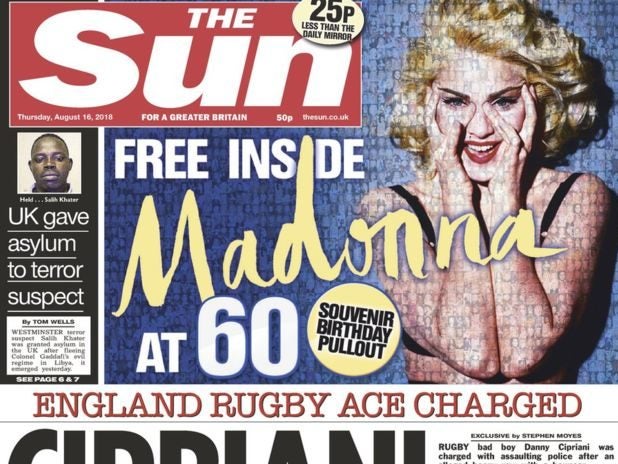
The Sun has said it will publish the names of people under police investigation “and accept the consequences in court”, despite a High Court ruling upholding suspects’ privacy rights over the press’ right to report.
In a defiant leader column today, the UK’s best-selling newspaper said it “will not be silenced” by the judgement, handed down by Mr Justice Mann last month, which found in favour of Sir Cliff Richard against the BBC.
“…rest assured that we will not be silenced by this ruling,” the Sun said. “Where we feel a story is sufficiently in the public interest, we will publish — and accept the consequences in court.”
Sir Cliff had been under investigation over an allegation of historical child sex abuse, but was never arrested or charged. The case was later dropped.
The BBC revealed the fact of the police probe in an afternoon new bulletin in August 2014, which included footage of a raid on Sir Cliff’s Berkshire home taken from a helicopter.
BBC News director Fran Unsworth said the High Court ruling marked a “dramatic shift against press freedom”, but in a statement yesterday the corporation said it would not pursue an appeal after legal advice suggested the prospects of being successful were “not promising”.
The publicly-funded BBC also fears spiralling court costs, having already paid out £1.9m over the case including £210,000 in damages awarded to Sir Cliff by the court.
The Sun said the BBC’s refusal to appeal represented a “dark day for the free press” and said Mr Justice Mann’s decision “needs more scrutiny than it has so far received”.
“The judgment gives all suspects a right to anonymity until they are charged, allowing early-stage investigations by the police to take place without any oversight at all,” the paper said.
“It is not paranoia to say that it opens up the possibility for the very principles of open justice to be thrown out of the window.”
The BBC has written to the Government to ask for a review of the law around the reporting of criminal investigations and the naming of those under investigation.
Said the Sun: “We hope that Parliament looks at our right to report, the principle of open justice, and proper oversight of the police and criminal justice system in the social media age.
“This is an issue too important to be settled by the flick of a judge’s pen.”
The i editor Oly Duff also said in an editorial published online yesterday that Mr Justice Mann’s ruling “ushers in a dangerous change to the law – and it needs to be challenged”.
He said: “It tips the delicate balance between an open society and privacy too far the towards secrecy. This ruling would help innocent people like Sir Cliff and Paul Gambaccini, undoubtedly.
“But it would also hurt countless victims of crime and make it harder to secure convictions in some cases.”
A Telegraph leader, also published yesterday, said the point of the appeal was to “clarify the law around privacy” following the High Court ruling.
It said: “Mr Justice Mann says it is not the case that the courts have imposed a blanket restriction on reporting police investigations.
“This is welcome and it is to be hoped that when newspapers take him at his word, his fellow judges will agree if a privacy action is brought before them.”
Email pged@pressgazette.co.uk to point out mistakes, provide story tips or send in a letter for publication on our "Letters Page" blog
